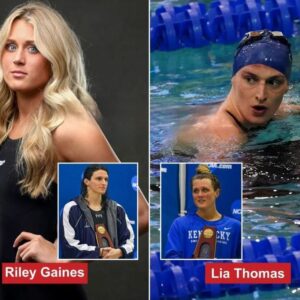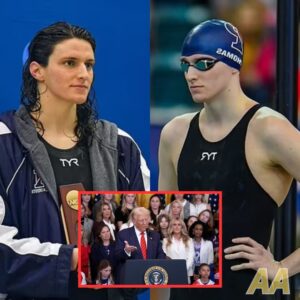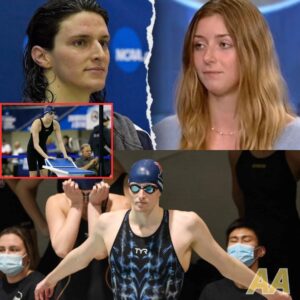
In recent days, reports have emerged claiming that the National Collegiate Athletic Association (NCAA) has stripped transgender swimmer Lia Thomas of all her medals, awarding them instead to former competitor Riley Gaines. These reports suggest that the decision came after significant public pressure and advocacy from various groups concerned about fairness in women’s sports.

Upon investigation, these claims appear to lack credible evidence and may have originated from satirical or unreliable sources. As of now, there is no official statement from the NCAA indicating any such action against Lia Thomas or in favor of Riley Gaines.
Lia Thomas, a swimmer for the University of Pennsylvania, made headlines as the first openly transgender athlete to win an NCAA Division I national championship in March 2022. Her participation and success in women’s swimming events sparked widespread debate over the inclusion of transgender athletes in women’s sports.

Riley Gaines, a former University of Kentucky swimmer, competed against Thomas in the 2022 NCAA championships. Gaines has been an outspoken advocate for maintaining what she views as fairness in women’s sports, expressing concerns about the inclusion of transgender athletes in female categories.
The NCAA has established policies regarding transgender athlete participation, requiring transgender women to undergo testosterone suppression for a specific period before competing in women’s events. These policies aim to balance inclusivity with competitive fairness, though they remain a topic of ongoing debate.
The dissemination of unverified claims about the NCAA’s actions highlights the challenges of misinformation in the digital age. Such narratives can exacerbate tensions and contribute to polarized discussions on sensitive topics like gender identity and sports.
It’s essential for media consumers to critically evaluate information sources and seek confirmation from official channels before accepting and sharing such claims. Relying on reputable news outlets and official statements can help mitigate the spread of misinformation.
In conclusion, the reports alleging that the NCAA has stripped Lia Thomas of her medals and awarded them to Riley Gaines are unsubstantiated. This situation underscores the importance of media literacy and the need for careful consumption of information, especially on contentious issues involving sports and gender identity.
News
(N) OFFICIAL : “Final verdict of the NCAA”: all of Lia Thomas’ Medals will be transferred to the beautiful Riley Gaines
The NCAA, college sports’ serial defendant, faces another federal lawsuit as more than a dozen female athletes sued the association, the University of Georgia and other defendants Thursday for alleged violations of Title IX, the Equal Protection Clause and the…
(N) Lia Thomas’ former teammates sue UPenn, Harvard and NCAA in lawsuit to scrub her records
Three former members of the University of Pennsylvania swimming team have taken action to expunge the women’s swimming records set by transgender former collegiate swimmer Lia Thomas. Grace Estabrook, Ellen Holmquist and Margot Kaczorowski, sued the university, Harvard University, the NCAA and the Ivy League Council…
(N) Openly transgender swimmer Lia Thomas speaks out against rhetoric regarding her NCAA win
Thomas’ Division I win sparked debates regarding transgender women playing women’s sports. The former UPenn swimmer says her transition has nothing to do with sports The unsigned statement comes after at least one anonymous member of the Penn women’s swimming…
(N) Lia Thomas out of Olympics after losing legal battle over transgender policy | Morning in America
Thomas made history in 2022, becoming the first transgender woman to win an NCAA swimming championship. Lia Thomas. Rich von Biberstein / Icon Sportswire via Getty Images file Transgender swimmer Lia Thomas lost a legal battle Wednesday challenging an effective ban on trans women competing…
(N) ‘SUCK IT UP’: Former UPenn swimmer sues Ivy league, NCAA over Lia Thomas
The controversy surrounding transgender athletes in competitive sports has once again made headlines as a former University of Pennsylvania swimmer has taken legal action against the Ivy League and the NCAA over their policies regarding transgender participation. The lawsuit, which…
(N) UPenn could face civil rights violation after trans athlete ban Lia Thomas
The University of Pennsylvania is among three colleges under investigation for a potential civil rights violation for allowing a transgender woman to compete in women’s sports. It follows President Donald Trump’s executive order banning transgender women from competing in women’s sports, where…
End of content
No more pages to load











